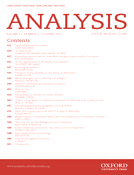-
Views
-
Cite
Cite
John Haldane, Identifying privative causes, Analysis, Volume 71, Issue 4, October 2011, Pages 611–619, https://doi.org/10.1093/analys/anr090
Close - Share Icon Share
Abstract
Causation by and of absences, omissions or privations, seems to be implied by common styles of description and explanation. Allowing that absences are actuality-dependent, one may yet maintain that they are ineliminable. Against the idea of privative causes stand the objections that there is no principled way to individuate them, or that any account of their identity is objectionally normative. Here I respond to these objections and provide an account of the conditions for identifying privative causes and effects. This invokes and provides support for an Aquinian powers and dispositions understanding of efficient causation.




